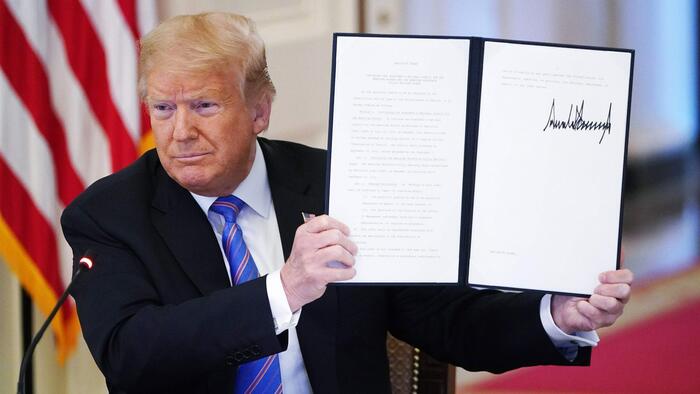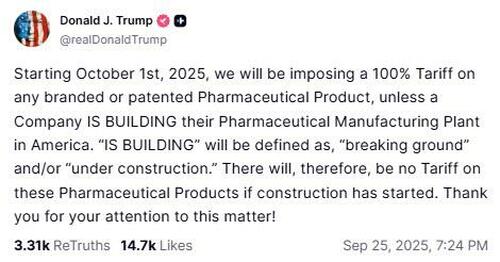


In a day already overflowing with news, late on Thursday President Trump announced a fresh round of tariffs set to take effect October 1, including a 25% tariff on all heavy truck imports, 30% tariff on upholstered furniture, 50% tariff on kitchen cabinets and bathroom vanities, and a 100% tariff on branded or patented drugs (unless a company is building a manufacturing plant in America), in a move that will likely send prices of Europe's pharmaceutical companies sliding. The decision followed an earlier investigation into pharmaceuticals launched in April, suggesting the duties may be imposed under specific section laws rather than reciprocal tariffs.
The tariffs, which are on top of sweeping reciprocal duties Trump has imposed on countries worldwide, are likely to spur a fresh round of outrage, particularly when it comes to pharmaceutical imports. Experts have raised concerns that those tariffs could cause supply chain issues and make certain drugs more difficult and expensive to acquire.
Trump posted on social media that there would be no levies on pharmaceutical imports if companies have broken ground on a US manufacturing plant, or if such a plant is under construction.
“Starting October 1st, 2025, we will be imposing a 100% Tariff on any branded or patented Pharmaceutical Product, unless a Company IS BUILDING their Pharmaceutical Manufacturing Plant in America,” Trump wrote. “There will, therefore, be no Tariff on these Pharmaceutical Products if construction has started.”
Trump’s announcement was one of several about new industry-focused tariffs set to begin next Wednesday. Imported heavy trucks will be subject to a 25% duty, kitchen cabinets and bathroom vanities will be hit with a 50% charge, and upholstered furniture imports are to be taxed at 30%.
Taken together, the moves amount to a rapid expansion of Trump’s tariff regime, which he started to erect shortly after taking office. It comes at a time when the president has flexed his executive powers like none of his modern predecessors; just as Trump made the levies public, former FBI Director James Comey — a longtime Trump political enemy — was indicted on perjury charges under heavy pressure from the president.
The posts offered no further details. But as Bloomberg notes, the pharmaceuticals plan, as described by the president, could allow for wide exemptions for multinational drug companies with presences in the US. The world’s largest drugmakers, including Merck and Eli Lilly operate scores of manufacturing sites across the globe. Nearly 90% of US biotech companies rely on imported components for at least half of their approved products, according to the Biotechnology Innovation Organization.
Asian stocks fell on news of the tariffs, with shares in Japan, Australia and South Korea all opening lower, while S&P 500 futures pared earlier gains. Asian pharmaceutical stocks slumped.
In April, the Commerce Department began investigating the impact of all drug imports — both finished generic and branded medicines as well as the ingredients used to make them — on US national security. By early July, Trump said he intended to give drug companies some leeway to bring their operations to the US before slapping tariffs of as much as 200% on their products. Then, on July 15, the president said he was likely to begin imposing tariffs on pharmaceuticals by the end of the month.
However, in late July, the US and EU reached a broad trade agreement that includes 15% tariffs on pharmaceutical products. That means European drug exports likely won’t be subject to the sector specific tariffs developed through the 232 investigation.
Trump is imposing product-bases levies using Section 232 of the Trade Expansion Act, which allows the administration to impose tariffs without congressional action if imports are deemed a national security threat. The approach has already been used to impose levies on automobile, copper, steel and aluminum imports.
Other duties on critical imports, including semiconductors and critical minerals, are expected in the coming weeks. His administration has also launched investigations into imports of robotics, industrial machinery and medical devices that could have wide-ranging effects for domestic manufacturers.
The sectoral tariffs offer potentially more durability than the country-level levies Trump imposed under the International Emergency Economic Powers Act. The Supreme Court has agreed to consider a challenge to those tariffs, after two lower courts have already declared them illegal.

